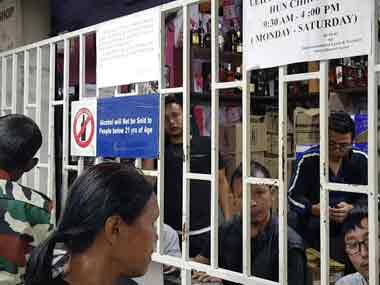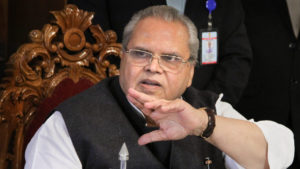When the first wine shop in Aizawl opened up on 16 March, 2015 after a period of 18 years, people queued up soon after to get their hands on legally sold whiskey and rum. The ban on alcohol sale in the hill state that came into force with the Mizoram Liquor Total Prohibition Act of 1995 was lifted by the Congress government by introducing the Mizoram Liquor Prohibition and Control Act (MLPC) 2014.
Three years down the line, as the 7.68 lakh voters of the state prepare to elect the members to the next state Assembly on 28 November, the fate of alcohol seems to be a crucial factor that could influence the outcome. Among the parties in the forefront are the ruling Congress, the Mizo National Front (MNF) and the Zoram Peoples’ Movement (ZPM). The Congress is seeking a third term, while the main opposition, MNF, vows to brush aside the Lal Thanhawla-led government.
After the MLPC Act 2014 replaced the Total Prohibition Act, three wine shops were opened in Aizawl, which were run by state-owned corporations, namely Zoram Industrial Development Corporation (ZIDCO), Mizoram Food and Allied Industries Corporation Ltd. (MIFCO) and Mizoram Agricultural Marketing Corporation Limited (MAMCO). According to a ZIDCO official, Zoa, the average alcohol sales every day for almost five months amounted to Rs 8 lakh. Going by this figure, the state exchequer made Rs 2.40 crore from alcohol sales in a month on an average for the first few months.
Deaths due to alcohol
The MNF, however, is promising a complete ban on alcohol if they win the elections, citing its bad influence on the society and painting the legal sale re-introduced by the Congress as a sinful attempt at garnering votes. The talk of the town in Aizawl is that if one wants to have quality spirits for another five years, they must vote Congress. But, if one is happy drinking low-quality liquor at exorbitant prices, they may go with the MNF.
Liansuama, one of MNF’s advisors, said that if MNF wins the elections this time, total prohibition will be implemented as soon as possible. “People struggling with drug and alcohol addiction will be delivered from their bondage of sins through the services of NGOs and church efforts,” he said.
While the MNF is vehemently against the liquor business, Lallianchhunga, Congress spokesman, said that alcohol is not an issue at all, but the secret alliance between MNF and BJP is what is the real issue this election, he added.
Meanwhile, the largest Christian organisation, the Presbyterian Church’s Social Front, which studied the effects of alcohol in society, issued a 42-page report last year. It found that alcohol-related deaths in Mizoram had increased after lifting the prohibition. The survey said that alcohol-related deaths in Aizawl’s four hospitals accounted for 16.32 percent of the total deaths.
The survey interviewed 873 people, in which 93.81 percent believed that alcohol causes a “negative impact on society”, while 63 percent people wanted total prohibition of liquor.
Reverend F Lalrinnunga, chairman of Mizoram Kohhran Hruaitute Committee (all-Churches organisation) says, “As members of the Mizoram Kohhran Hruaitute Committee (MKHC) we don’t have anything to say about prohibition.” He adds that the biggest church in Mizoram, the Presbyterian Church Synod, had appealed to the government not to lift the prohibition, but failed in its attempt.
State BJP president JV Hluna says that if they win the election and form a government, they will stop all liquor imports from other states, but will encourage locally-made liquor.
Lallianchhunga adds that, as a party, they will have no hesitation in lifting the MLPC Act and reinstating the prohibition. But that would be after careful consultation with party workers and the church bodies, and only after going through the results of a study conducted by the state government, he said.
Alcohol vendors vouching for Congress win
Meanwhile, alcohol vendors and suppliers, who have invested lots of money in the industry, are worried about the outcome of the elections. If the ruling Congress loses the battle, it will mean the end of their high-yielding three-year business.
V Lalliantluanga, a liquor vendor in Aizawl, says that if the Congress does not win the elections this time, and if the alcohol ban comes into effect, he’ll have to look for a new job, along with several others in the industry.
To purchase alcohol in the state, one would need a liquor permit, which is issued by the Excise and the Narcotics Department. This liquor permit puts a strict limit on alcohol, allowing only six bottles of hard liquor and 10 bottles of wine and beer for “personal bonafide consumption”. Those who visit the state can purchase alcohol by furnishing their inner-line permit.
Main sources of income for the state
The excise department’s website reveals that alcohol-related deaths went up from 22 in 2016 to 59 in 2017. However, a high-ranking official from the department said that the sale of alcohol has gone down tremendously in the past year, which means that people are now more aware of their health and spending. “As a society, we have learned how to drink more responsibly,” he said.
Now, there are 48 liquor shops in Mizoram. The proceeds from the alcohol business are one of the main sources of revenue to the state government. In the latest report obtained from the department during the past financial year (April 2017 to March 2018), the revenue received under the MLPC Act was Rs 65.68 crore, surpassing the target of Rs 51.5 crore for the year.
source: Firstpost.com








































